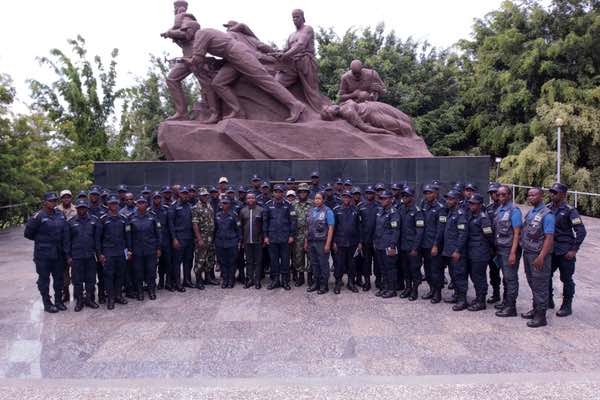
Forty-five Junior Police officers currently attending the 12th intake of the ‘Police Tactical Commanders Course,’ have started a study tour as part of their five-month course at the National Police College (NPC) in Musanze District.
The officers include those from Rwanda National Police (RNP), Rwanda Investigation Bureau (RIB), Rwanda Correctional Service (RCS) and Allied Students from Malawi Police Service (MPS).
On Friday, November 25, the officers visited the Campaign Against Genocide Museum at the parliamentary building in Kimihurura and the National Heroes’ Mausoleum in Remera, both in Gasabo District.
At the Campaign Against Genocide Museum, they were given a deep understanding on the liberation struggle, how the then ruling government planned, organized and executed the 1994 Genocide against the Tutsi; and how the international community abandoned Rwandans to be massacred.
The students were explained on how the Rwanda Patriotic Army (RPA) stopped the Genocide and how it liberated Rwandans.
At the National Heroes’ Mausoleum, the Police students laid wreaths in honor of national heroes laid to rest there.
“These are heroes, who died for the cause and it is always good for the young people, who have picked up the mantle to learn this history to continue building their country and the values that define Rwandans,” Deo Nkusi, the executive secretary for Chancellery for Heroes, National Orders and Decorations of Honours (CHENO), said.
Early this week, the Tactical course students visited Umulindi w’Inywari in Kaniga Sector, Gicumbi District.
They also laid wreaths at Genocide Memorial Centre in Gisozi to pay tribute to more than one millions lives killed during the 1994 Genocide against the Tutsi, where they were also given an in-depth understanding on how the Genocide was planned and implemented.
The Police Tactical Commanders Course is designed to improve the skills of officers in various aspects of policing fields, as well as interpretation of superiors’ intent in daily activities, human security and leadership. (End)
